Is it worth buying a drone for real estate photos and videos?
Based on the research, 71% of people who want to sell a house prefer working with real estate agents that provide drone services. 88% of the owners of big mansions with a huge territory also like drone photos of their properties.
When a real estate agent uses drones for real estate photos, house owners have more chances to sell their property at a higher price. Clients will pay $500-700 for a 2-minute drone video. If you want to try your hand at this, you should opt for a drone suitable both for interiors and exteriors.
Drone technologies are used in various business niches. When shooting a house from a bird’s eye view, you can show the beauty of the whole territory. A quadcopter will help you sell a property faster and at a higher price.

Camera effective pixels: 20 MP | Max video resolution: 4K@30 fps | Stabilization: 3-axis (tilt, roll, pan) | Intelligent modes: TapFly, ActiveTrack, Draw mode, Gesture mode | Control modes: remote controller (RC) | Hover or attitude holding: 30 min
If you are looking for the best drone for real estate photography, take a look at this model. The DJI company has a good reputation in the drone market. Its quadcopters top the list of real estate photo equipment. The DJI Phantom 4 Pro is easy to use, which makes it a perfect fit for experts and amateurs alike.
The Pro version of the drone has a 5-point obstacle detection system. When the device detects an obstacle, it immediately stops. Thus, you don’t need to worry about crashes when shooting videos. You can use this aerial photography drone with the DJI GO 4 app that enables you to set the flight way and return the drone to the starting point.
Thanks to a 20MP CMOS camera, you can record 4K footage at 60fps and earn more money with your real estate photography. It’s probably the best camera for such a device. The camera is stabilized thanks to an inbuilt 3 Axis Gimbal. The DJI GO 4 app allows adjusting ISO, controlling aperture and a mechanical shutter of the camera, which makes the DJI Phantom 4 Pro the best drone for real estate photography in 2017-2020.
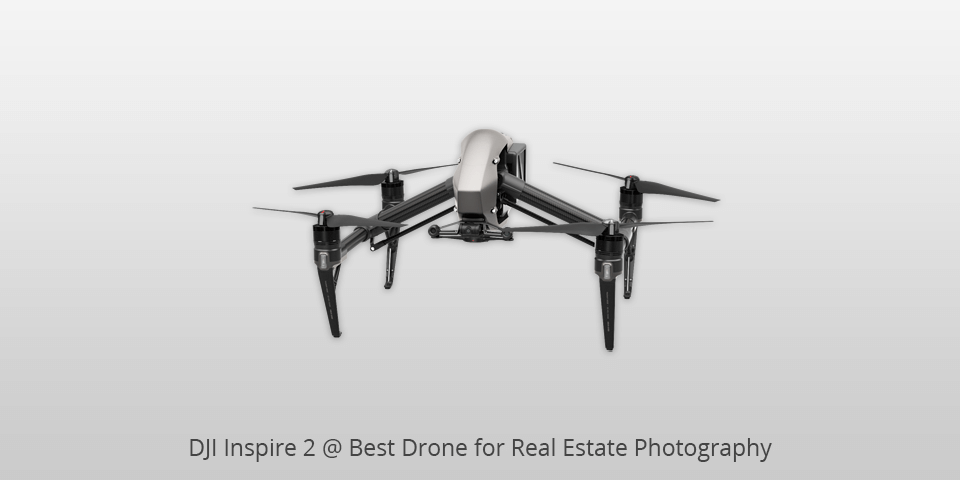
Camera effective pixels: 20 MP | Max video resolution: 6K@30 fps | Stabilization: 3-axis (tilt, roll, pan) | Intelligent modes: Spotlight Pro | Control modes: remote controller (RC) | Hover or attitude holding: 27 min
With the DJI Inspire, you can create drone videos like in Hollywood movies. The quadcopter is equipped with the ZENMUSE X5S camera that enables you to replace lenses for various types of shooting. With this drone, you can take high-quality footage. This drone for real estate photography supports good image stabilization.
The TYPHOON H allows two pilots to control the device. However, the Inspire 2 model can be controlled only by one person. It features detection sensors on all sides, so it’s really hard to crash or damage it.
It’s better not to compromise on quality since, eventually, you will have to invest in real estate photo editing. With the DJI Inspire 2, you will get Hollywood-quality footage.
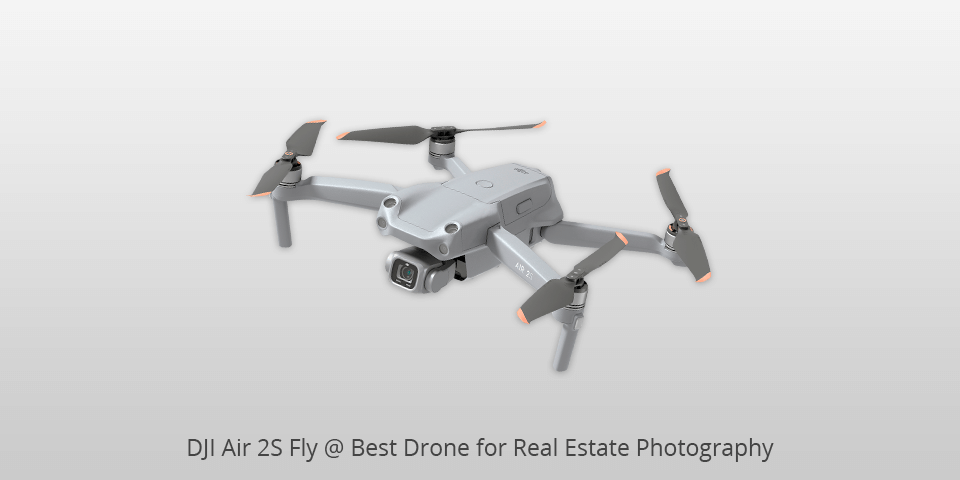
Camera effective pixels: 20 MP | Max video resolution: 5.4K@30 fps | Stabilization: 3-axis (tilt, roll, pan) | Intelligent modes: Spotlight, ActiveTrack, Point of Interest | Control modes: remote controller (RC) | Hover or attitude holding: 31 min
The DJI Air 2S is a small-scale foldable drone with a premium-class camera and a reliable obstacle detection system. It has such auto-flight functions as Spotlight, ActiveTrack, and Point of Interest.
The quadcopter is equipped with a powerful lithium polymer battery that allows flying up to 31 minutes with optimal settings, which makes it one of the best drones for real estate photography.
When it comes to safety features, this drone has much to offer. The Air 2S positioning system uses GPS and GLONASS satellites as well as visual sensors to detect the location and perform precision hover landing. It has an auto return-to-home feature and an obstacle detection system. It also supports geo zones. The Air 2S is quite lightweight, so you can hold it with one hand. It is no bigger than a full-frame 24-27mm zoom lens, so you can carry it in your camera bag.
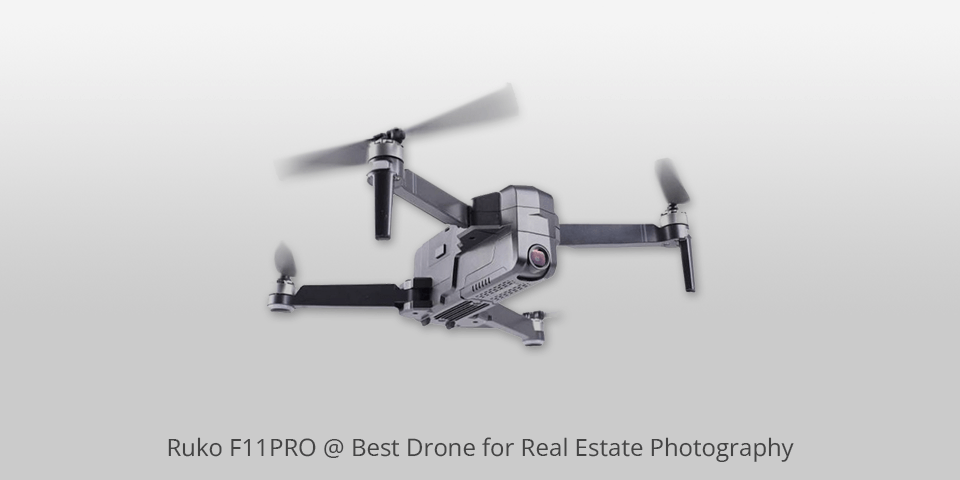
Camera effective pixels: 8.3 MP | Max video resolution: 4K UHD 2160p | Stabilization: 3-axis (tilt, roll, pan) | Intelligent modes: Spotlight, Headless | Control modes: remote controller (RC) | Hover or attitude holding: 30 min
The Ruko F11 Pro has great value for the money considering its set of advanced features and excellent specs. When it comes to selecting a drone for real estate photography, I always pay attention to the available features, and this model has everything I have ever needed. It is extremely easy to use and comes with a 25-to-30-minute battery for extended flight time.
You can quickly learn how to use it even without any previous experience. While you might notice some problems with colors when using its 2.7K camera, it is still a good option to consider.
This model would be a great gift to anyone interested in learning how to fly drones. It will also come in handy for those who want to master the creation of dynamic content.
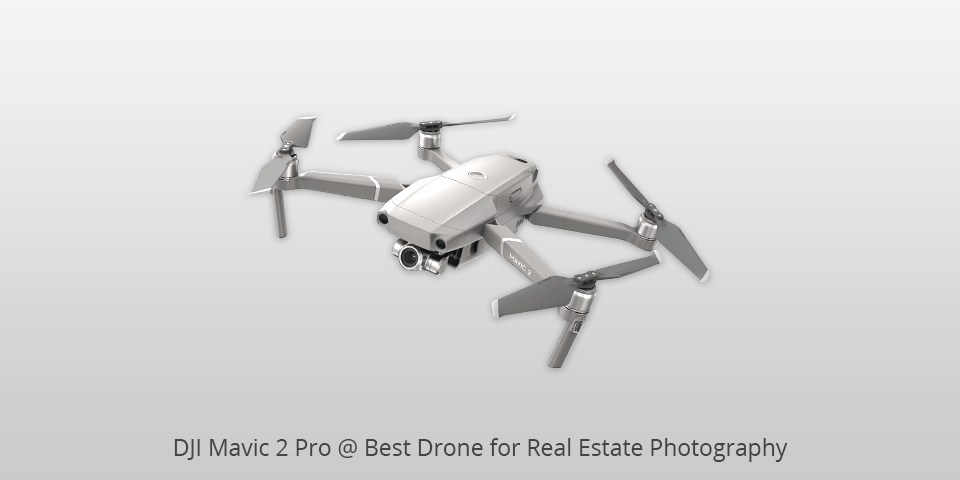
Camera effective pixels: 20 MP | Max video resolution: 4K@30 fps | Stabilization: 3-axis (tilt, roll, pan) | Intelligent modes: ActiveTrack, Dolly Zoom | Control modes: remote controller (RC) | Hover or attitude holding: 31 min
The DJI Mavic 2 Pro is the best drone for real estate photography that has several key selling points, such as a Hasselblad camera, 2x optical zoom, 4K video support, 31-minute flight time, 20MP 1-inch CMOS sensor, 10-bit Dlog- M, 10-bit HDR video, and adjustable aperture from f/2.8 to f/11.
The drone features in-built obstacle avoidance sensors. In most flight modes, front, back, up and down sensors are always active, so the quadcopter stops when they detect an obstacle. In the ActiveTrack mode, it can detect and track a moving object thanks to activated side sensors. They also work in the tripod mode and low-speed mode, thus allowing you to slowly move the drone to get high-quality footage.
In the app, you can use a special capture mode, like Hyperlapse to shoot video frame by frame. There are also other auto flight modes and options, including Asteroid that combines panorama images and videos to turn an ordinary view into a projection of a small planet.
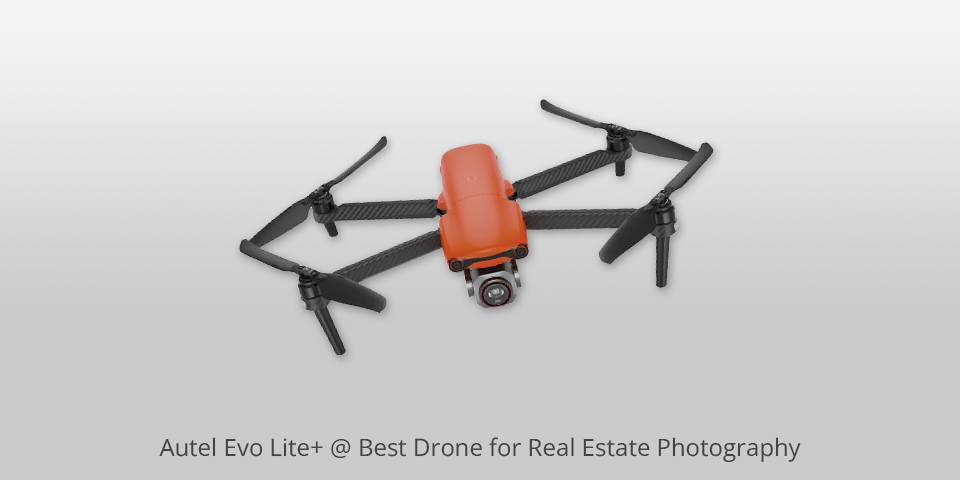
Camera effective pixels: 20 MP | Max video resolution: 6K at 24/25/30fps | Stabilization: 3-axis (tilt, roll, pan) | Intelligent modes: IOC | Control modes: remote controller (RC) | Hover or attitude holding: 40 min
The Evo Lite+ is the latest model of drone released by Autel Robotics. It is equipped with a 1″ CMOS sensor, which allows you to use it for shooting 6K footage of the highest quality. With the maximum ISO value reaching 48000, this drone for real estate photography is one of the best options in this price bracket. It boasts the max flight time of 40 minutes, which enables a photographer to capture an object from all angles.
You don’t need to worry about obstacles as this Autel Robotics drone is fitted with three-way obstacle sensors. It allows you to use it in locations with many trees around. As the max flight range is 7.4 miles, you can fly this model safely without losing the connection between your drone and radio.
As the drone has 6 GB of storage, you will have plenty of space for storing your photos. However, you might need to purchase a microSD card in case you want to capture video footage at 6K.
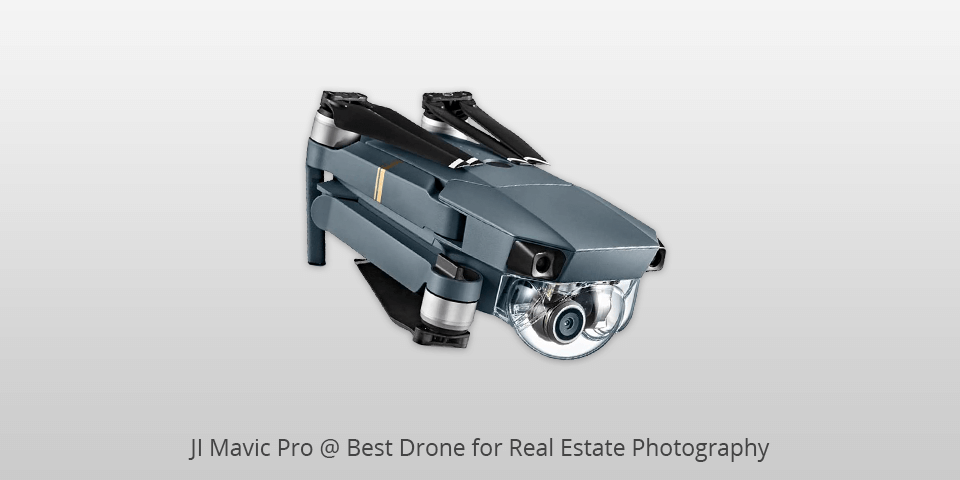
Camera effective pixels: 12 MP | Max video resolution: 4K@30 fps | Stabilization: 3-axis (tilt, roll, pan) | Intelligent modes: Active Track, Gesture Mode, Tapfly, Tripod, and Cinematic modes | Control modes: remote controller (RC) | Hover or attitude holding: 27 min
The Mavic Pro can shoot 4K videos. It can fly 4.4 miles while the flight lasts up to 27 minutes. The Mavic Pro quadcopter has the same camera as the DJI Phantom 4. The model is quite compact. You can fold it and put it into a small drone backpack.
In the TapFly mode, you can tap on the screen and the drone will automatically fly in this direction without bumping into obstacles. In the gesture mode, the drone can define your location, frame the image so that you are in the center, and then take a shot. All you need to do is to make a frame with your fingers. The drone will do everything else. You can use the Active Track mode to make the quadcopter trace the object.
This drone for real estate photography has the OcuSync air system. It allows broadcasting videos at a long distance (up to 5 miles). You can download videos and shots with a speed of 40 Mbit/s.
| IMAGE | NAME | FEATURES | |
|---|---|---|---|

|
DJI Phantom 4 PRO
Our Choice
|
CHECK PRICE → | |

|
DJI Inspire 2
BEST CAMERA
|
CHECK PRICE → | |

|
DJI Air 2S Fly
8GB of storage
|
CHECK PRICE → |
A suitable drone will help you take impressive shots and record unmatched real-estate videos. Remember that drone photography doesn’t guarantee that you will sell your property, however, it will definitely increase your listing’s visibility.

Shooting quality. If you want to get great shots from the bird-eye view without much noise, make sure to buy a camera with at least 16MP that supports 4K and has a 2.3-inch CMOS sensor. You can start with it and then consider more expensive options depending on your budget.
Flying characteristics. To create real estate videos, you don’t need a super-fast drone. The maximum speed of 40 km/h is more than enough.
Operational independence. Your drone should work for at least 20 minutes in shooting mode. This time is enough to demonstrate the house and surrounding territory.
In-built security options. One of the most important aspects of the drone for real estate is safety. A quadcopter should feature GPS positioning and viewing sensors that allow you to shoot in difficult conditions, for example in the garden.
Smart functions. Smart flying modes are a pleasant addition that will allow you to use third-party video editing software and create fascinating shots in one click.
In 2015, there was an incident in Kentucky. A photographer’s quadcopter was shot down by the gun. After this episode, the Federal Aviation Administration (FAA) regulated the issue of drone use on the legislative level. Thus, if you want to get a drone for real estate photography, you should follow some rules when using it.
If you are a real estate photographer who plans to work with an unmanned aerial vehicle (UAV), you have to pass an FAA test and take Part 107 certification. When I registered, the commission fee was around $5, and I got a three-year license. Now, you will have to pay approximately $20-25.
You are wrong if you think you can cheat the system and conduct several flights without registration. The leader of the drone market, the DJI Company, introduced a requirement to register a quadcopter when buying it. If you fail to do that, the UAV will not work (it remains blocked). Of course, other producers don’t require mandatory registration, but still, you can’t legally take shots and record videos without registration.
In case you actively use a drone for real estate photography, you should have liability insurance. What’s more, clients always ask to show an FAA certification and insurance. If a quadcopter damages somebody’s property, the damage will be covered by insurance.
When flying your quadcopter, you might capture the neighboring houses and people in the yards. Thus, to avoid conflicts, ask your client to inform neighbors about the drone photo shooting. This way they won’t think that somebody is spying on them.
In case someone tries to shoot down your drone or damage it in some other way, you can call the police. If you have an FAA certification, the law is on your side.
NOTE! However, mind that you are not officially allowed to fly drones everywhere. There are specific areas that are off-limits. You can install the AirMap app to know where you are authorized to fly.
Golden time. Like with other photography genres, an hour after sunrise is an ideal time for taking real estate shots. During this period, the natural lighting makes wonders in the frame.
Drone moves. It’s recommended to start shooting a few hundred meters from the house to demonstrate the property item and the surrounding territory.
Panorama. You can create the impression of a three-dimensional image by flying over the whole area from the left to the right.
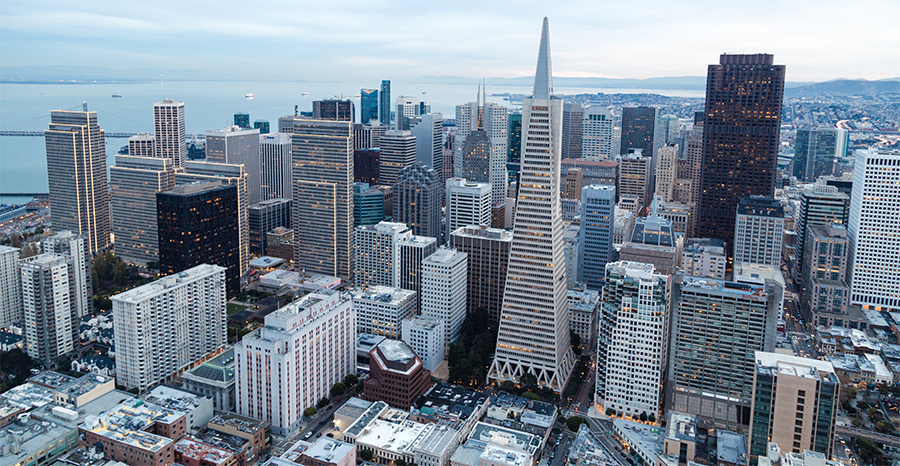
Movement. When shooting a real estate video, try to demonstrate some movement in the frame. For instance, you can show a fountain or a car driving into a garage.
Besides using drones for real estate outdoor shooting, you can use them to record videos of interiors. Owners of big residences are interested in 3D tours that might make their properties more appealing to potential customers. A quadcopter can fly to each room and demonstrate the interior. This way, clients might feel as if they are walking in the house. However, when creating indoor 3D tours, you should mind some aspects.
Room size. If the room is around 50 square meters, you shouldn’t use a drone for real estate photography. However, if the house is 500-1000 square meters, it’s quite okay for a quadcopter. You should also get prepared before the flight. Study the path of the future flight, estimate the room size as well as the sizes of doorways and windows.
Don’t forget that the UAV can crash into furniture or paintings. Of course, modern drones for real estate photography are equipped with obstacle detection systems, but you can’t activate them while shooting videos inside. The drone will constantly stop since every house is full of obstacles.
Lighting. The best drones for real estate photography come with high-quality cameras that allow you to shoot great footage outdoors. Big houses often have huge windows, so you won’t have any lighting issues. However, if the lighting is dim, you might notice some noise. Thus, it’s better to use a DSLR camera with a stabilizer.
Remove unnecessary things. Make sure to check that there aren’t any dirty dishes in the sink and unnecessary things in the room. Mind that dogs or cats should be taken somewhere since a quadcopter can harm them, or vise versa.
On average, drone photography costs $250-350 dollars. The final price of air photography and video recording will depend on the duration of shooting, permissions that you need to get and the number of services. The shooting with a length of more than 90 minutes might cost from $50 to $70 more.
Before Christmas, the Federal Aviation Administration (FAA) introduced a proposal with regulations that would allow them to track every drone in the USA airspace.
Don’t fly it at night unless your quadcopter has special lighting allowing you to know its location and orientation. If you attach a strobe light, you should register it in FAA since you are likely to exceed the limit of 250 g.